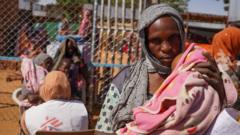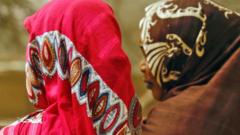As Band Aid releases a new version of "Do They Know It’s Christmas?" to mark its 40th anniversary, the song's legacy is being scrutinized, with calls for a re-evaluation of how Africa is portrayed in fundraising efforts.
Band Aid's Legacy: A Controversial Christmas Hit 40 Years Later

Band Aid's Legacy: A Controversial Christmas Hit 40 Years Later
The song that stirred international philanthropy faces renewed criticism for its outdated narratives about Africa.
In a remarkable reflection on its legacy, the Band Aid single "Do They Know It’s Christmas?" celebrates its 40th anniversary yet continues to draw ire for its portrayal of Africa. Originally recorded in 1984 by prominent musicians like Bob Geldof and Midge Ure, the track aimed to raise funds for the Ethiopian famine. However, as Ethiopia celebrates Christmas on January 7, many are questioning the song’s underlying message, which paints a grossly distorted image of the continent.
Critics argue the song's lyrics, suggesting a place devoid of hope, feeding into harmful stereotypes. Dawit Giorgis, an Ethiopian official during the famine, lamented that it invalidated Ethiopia's rich Christian heritage, stating, “We knew Christmas before your ancestors.” He acknowledges the life-saving impact of the charitable response, but points out the misleading representation in the song’s message.
As the Band Aid Trust announces over £3 million in assistance to aid 350,000 people across Ethiopia, Sudan, Somaliland, and Chad, skepticism about the portrayal persists. Musicians including Ed Sheeran express discomfort over the implications of their involvement in past recordings, noting how narratives about Africa have changed substantially over the past few decades—prompting younger artists like British-Ghanaian rapper Fuse ODG to challenge the notion that Africa is synonymous with suffering.
Research indicates that charity campaigns often embody a skewed image of Africa, perpetuating colonial attitudes that overlook the continent's complexities. The call for a contemporary approach to aid reflects a growing awareness that Africans deserve agency and representation rather than being depicted solely as victims. As discussions evolve, voices advocating for African-led narratives and collaborations gain traction, emphasizing the need for a future where African stories are told by Africans themselves, rather than through a Western lens.
Scholars and activists alike stress the importance of shifting the narrative in charitable efforts, recognizing that genuine understanding and participation are critical in creating impactful campaigns. The debate surrounding Band Aid not only highlights past missteps but sets the stage for a more inclusive approach to philanthropy—one that harmonizes Africa’s narrative with its own voices.



















